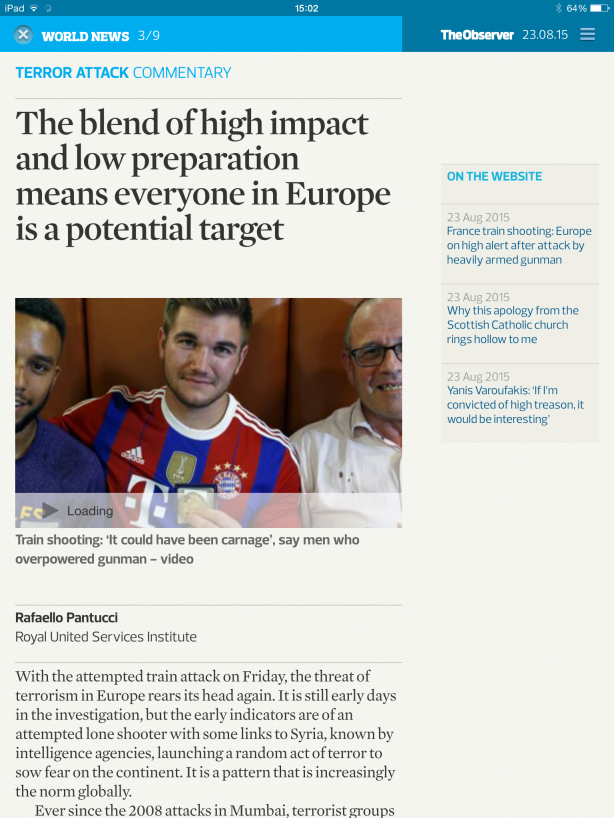And my second post for the day, this time for an Observer article I wrote for the weekend’s paper in the wake of the near-miss terrorist incident in France on Friday. The piece oddly only appears in the iPad edition and the hardcopy, but here is the text below and a screenshot from the iPad. Worth pointing out the title was the papers choice. I also spoke to the Financial Times about the repercussions of the attack and had a longer interview with AFP which has been picked up in a number of different ways.
The Blend of high impact and low preparation means everyone in Europe is a potential target
Raffaello Pantucci
Royal United Services Institute
With the attempted train attack on Friday, the threat of terrorism in Europe rears its head again. It is still early days in the investigation, but the early indicators are of an attempted lone shooter with some links to Syria, known by intelligence agencies launching a random act of terror to sow fear into the continent. It is a pattern of facts that is increasingly the norm globally.
Ever since 2008 terrorist attacks in Mumbai, terrorist groups have sought to launch mass casualty shootings on soft targets. The blend of high impact and low preparation required makes it an appealing way of getting your message across.
The potential targets are limitless, and the only requirement is to obtain a gun – something that is easier in continental Europe than in the UK. In addition, Islamic State’s leadership has been shouting to anyone who would listen or read their material that it considers anything a target. The result has been a spate of similar attacks in Europe and abroad.
The attack in Sousse saw a marauding gunmen massacre holidaymakers as they enjoyed Tunisia’s heritage and beaches. In Brussels, visitors to a Jewish museum were gunned down by a terrorist linked to ISIS as they enjoyed an afternoon tour.
In Copenhagen, a lone shooter opened fire at a public event featuring cartoonist Lars Viks, killing a bystander, before heading to a nearby synagogue where he murdered guards that had been put there to protect the institution from people like him.
In Canada a gunman shot a soldier as he stood on parade in Ottawa. And in January this year, two brothers murdered their way through the editorial staff of the magazine Charlie Hebdo and shot a policeman in the street as an acquaintance held a group of shoppers hostage in a Jewish supermarket.
And then there are the numerous other plots that did not involve guns, or those that were prevented from coming to fruition by alert authorities.
With strict gun controls, the UK has been fortunate in not having faced many such incidents. But authorities have considered and trained for the possibility, and armed response units are increasingly visible on our streets.
On the continent, individual member states have varied legislation around weapons, and the free movement of citizens between countries requiring ever-tighter cooperation between agencies whose default mode is secretive. Visit Brussels today and armed soldiers stand prominently on display in their camouflage outside most public buildings.
In many ways these displays are a signal of terrorist victory, a sign that we have had to militarize our response to a criminal justice problem at home. But the sad truth is that they reflect the reality of the current threat picture where a growing number of Europeans and young men globally have first hand experience of guns and a battlefield, while terrorist groups are exhorting them constantly to launch such attacks.
Raffaello Pantucci is Director, International Security Studies at RUSI and the author of We Love Death As You Love Life: Britain’s Suburban Terrorists


Prime Minister Perceval was murdered by a lone gunman in the houses of Parliament back in 1812 – the epitome of high impact & low prep/cost. those who do not learn from history…. at present the only meaningful countermeasure seems to be a blend judicious surveillance, focussed intelligence, and a smattering of luck.